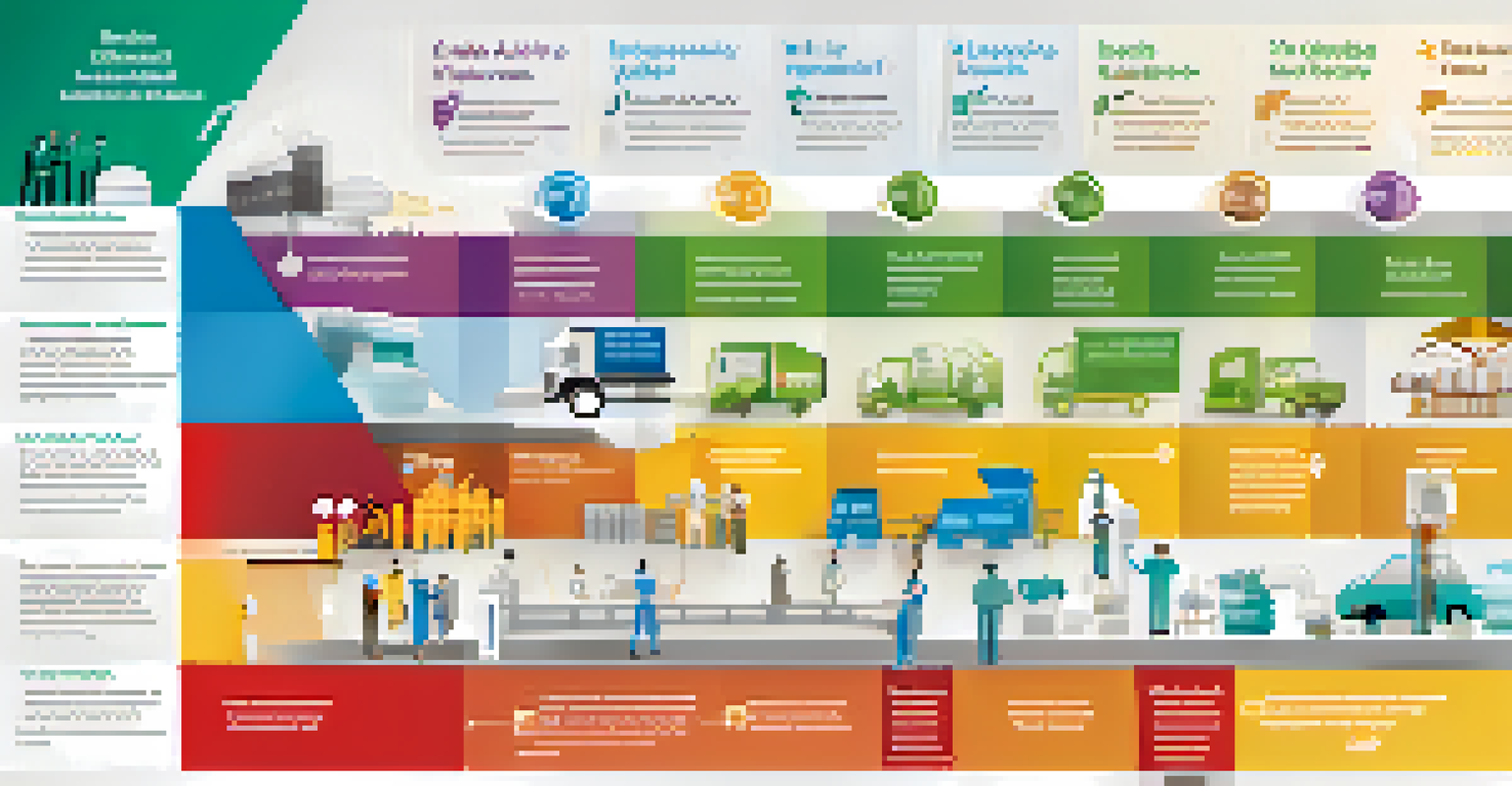Evaluating Suppliers: Ethical Considerations and Criteria

Understanding the Importance of Ethical Supplier Evaluation
Evaluating suppliers through an ethical lens is crucial for businesses today. It helps ensure that the products and services you offer align with your brand values and resonate with your customers. More consumers are prioritizing transparency and social responsibility, making it imperative to choose suppliers who reflect these principles.
Ethical businesses are not just about compliance; they are about genuine care for the well-being of others.
Furthermore, ethical supplier evaluation can protect your company from reputational damage. If a supplier is found to engage in unethical practices, your brand could face backlash, leading to a loss of trust among your customers. Thus, a careful assessment of your suppliers not only safeguards your reputation but also promotes a sustainable business model.
Lastly, prioritizing ethical considerations in your supplier evaluation can create a positive ripple effect. By supporting suppliers who adhere to ethical standards, you encourage industry-wide change, inspiring others to follow suit. In this way, your business can play a part in fostering a more equitable and sustainable marketplace.
Defining Clear Ethical Criteria for Supplier Evaluation
To effectively evaluate suppliers, it’s essential to establish clear ethical criteria. Consider factors such as labor practices, environmental impact, and corporate governance. By defining what ethical practices mean for your business, you create a structured approach that simplifies the evaluation process.

For instance, you might look for suppliers who provide fair wages and safe working conditions for their employees. Additionally, assessing a supplier's environmental policies can help you understand their commitment to sustainability. These criteria not only streamline your selection process but also align with your company's values.
Ethical Evaluation Protects Reputation
Evaluating suppliers based on ethical standards safeguards your brand from potential reputational damage.
Moreover, documenting these criteria allows for consistent evaluations across different suppliers. This documentation can serve as a reference point during discussions and negotiations, ensuring that everyone involved understands your ethical priorities. Consistency in evaluation fosters trust and accountability throughout the supply chain.
Researching Supplier Backgrounds and Practices
Once you’ve established ethical criteria, the next step is thorough research on potential suppliers. This involves digging into their business practices, history, and reputation. Utilize resources like online reviews, industry reports, and third-party audits to gather comprehensive insights about each supplier.
The greatest danger in times of turbulence is not the turbulence; it is to act with yesterday's logic.
You can also benefit from networking with other businesses that have worked with these suppliers. Their firsthand experiences can provide valuable information about the supplier's ethical practices and reliability. Don't hesitate to ask for references and testimonials to better understand the supplier's credibility.
In addition, consider utilizing tools like social media to gauge public perception of your potential suppliers. Engaging with their content or checking their interactions can reveal a lot about their values and commitment to ethical practices. This research phase is crucial for making informed decisions that align with your company’s ethical standards.
Conducting Supplier Site Visits and Audits
One of the most effective ways to assess a supplier's ethical practices is through site visits and audits. These visits allow you to see their operations firsthand and evaluate working conditions, safety measures, and environmental practices. A personal visit can reveal things that reports or reviews may not highlight.
During these visits, take the opportunity to speak with employees and management. Their insights can provide a deeper understanding of the company's culture and values. Engaging directly with the workforce can help you gauge whether the supplier genuinely practices what they preach regarding ethical standards.
Clear Criteria Streamlines Selection
Establishing clear ethical criteria simplifies the supplier evaluation process and aligns choices with company values.
Additionally, conducting regular audits ensures ongoing compliance with your ethical criteria. This process not only helps hold suppliers accountable but also fosters a collaborative relationship where both parties can work towards continuous improvement. Site visits and audits are valuable tools in maintaining ethical integrity throughout your supply chain.
Evaluating Supplier Compliance with Ethical Standards
After gathering all necessary information, it's time to evaluate whether suppliers meet your established ethical standards. This evaluation should be a systematic process, considering all aspects of their operations against your criteria. Create a scoring system or checklist to help quantify their compliance.
For example, you could rate suppliers based on their labor practices, environmental policies, and transparency. This structured approach allows for clearer comparisons between suppliers and helps identify those who stand out in terms of ethical practices. It's essential to remain objective and fair in this evaluation process.
Moreover, be open to discussions with suppliers about their practices. If a supplier falls short in certain areas, consider discussing potential improvements rather than dismissing them outright. This collaborative approach can lead to better practices and stronger partnerships in the long run.
Building Strong Relationships with Ethical Suppliers
Once you've selected suppliers who meet your ethical criteria, it’s crucial to build strong relationships with them. Open communication and mutual respect can foster collaboration and innovation, benefiting both parties. Strong relationships can also lead to better negotiation outcomes and shared values.
Consider engaging with your suppliers regularly to discuss not only performance but also their challenges and successes. This engagement can create a partnership atmosphere where both sides feel valued and understood. By supporting your suppliers, you contribute to their growth and commitment to ethical practices.
Continuous Improvement is Essential
Regular monitoring and engagement with suppliers foster ongoing compliance and promote a culture of ethical practices.
Additionally, recognizing and rewarding suppliers who excel in ethical practices can motivate them to maintain high standards. Consider creating an incentive program or public acknowledgment for suppliers who align with your values. These efforts can strengthen your partnerships and foster a positive supply chain culture.
Continuously Monitoring and Improving Supplier Practices
Supplier evaluation is not a one-time task; it requires continuous monitoring and improvement. Establishing regular checkpoints can help ensure that suppliers remain compliant with your ethical standards. This process can involve periodic audits, feedback sessions, and performance reviews.
Encouraging suppliers to adopt best practices and innovate can lead to a more ethical supply chain. Share resources, training, and insights with your suppliers to help them improve. Collaborating on solutions can drive positive change and create a stronger partnership focused on ethics.

Moreover, be prepared to adjust your criteria and expectations as industry standards evolve. Keeping an eye on trends and regulatory changes can help you stay ahead in ethical supplier evaluation. By fostering a culture of continuous improvement, your business can lead by example and inspire others to prioritize ethics in their supply chains.